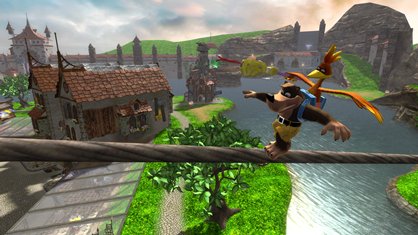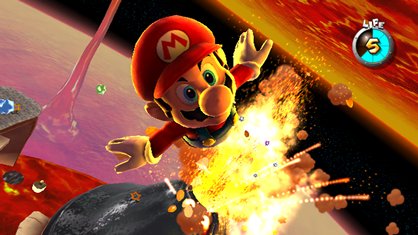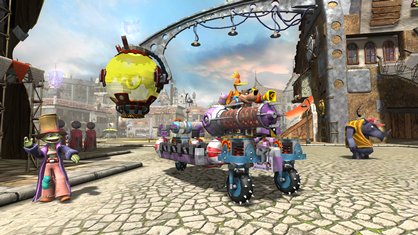Banjo-Kazooie: Nuts & Bolts - interview
Banjo-Kazooie: Nuts & Boltsis up there with Gears of War 2 as far as 360's monster games of 2008 go for us. We've seen a bit about Gears 2 already, and now Rare's finally lifted the cauldron lid on Banjo's third adventure.
To get an idea on what we can expect, check out ourhands-on preview. But to find outhow the change in direction came about, read this very exclusive interview with Rare's head of design, Gregg Mayles, who was on the team of the very first Banjo game all those years ago.
So Banjo's been out of the limelight for a while now. What's he been up to?
Gregg Mayles: He's been slobbing out. As you'll see in the storyline, Banjo's no longer his slim, fit self and he's been in retirement and gone to seed. He's in retirement, Grunty is just a head so you think these two are never going to star in another game ever. But we'll bring them back to life and, as you see, Grunty gets a mechanical body, Banjo will be reformed to his formal self and off they go again on another adventure.

Last time you made a Banjo game you were under Nintendo's wing. Now you're in bed with Microsoft. What's the difference?
Mayles: In terms of our thinking behind the Banjo game, zero. We consciously have made no decisions because it's for a different company. Obviously we've got the use of multiplayer this time, which - although in Banjo-Tooie we did explore it to a certain degree, we certainly couldn't do half the stuff we've got planned for multiplayer this time.
I guess that's really the only difference. Everything is much the same. The humour's the same, the characters are the same, [and so is] the feel of the game.
Weekly digests, tales from the communities you love, and more
What's been the reaction to the game outside of Rare so far?
Mayles: People have grasped it a lot quicker than we thought. We thought there might be some kind of, 'This isn't Banjo any more, what's going on?' But this hasn't proved to be the case. People can see what we've done and how we're trying to approach the platform genre in a slightly different way.
The traditional Banjo game was like, 'here's a character, we'll give you some moves but they're fixed abilities, and you use those fixed abilities to try and discover the solution to a designed problem.'
[In the new game] we're giving you a load of abilities, and you're able to combine those abilities however you feel will solve the problem. So rather than it being a case of trying to find the designer's way of doing it, maybe you can find your own way of doing it. I guess that, in a nutshell, is really what the game is, just having the freedom of trying to find your own way of doing things rather than what we tell you.
How do you think the Banjo hardcore will react to the changes?
Mayles: I think the generation of players that have played Banjo before are probably going to be shocked to start with. They're probably going to look at it and say, 'Hang on a sec, this isn't the Banjo I was expecting. What have you done? You've ruined it!'
But then hopefully, in a very short space of time, they'll be able to see what we've done and like it. You're never going to be able to change people's opinions of the old games and how they felt at the time. Obviously you're going to get a certain amount of rose-tinted glasses looking back on the old game being this wonderful masterpiece and nothing was ever wrong with it.
Presumably the game's going to be full of classic Rare humour?
Mayles: Yes, very much so. The humour of Banjo comes a lot from me, being that I led the first two games and now I'm on this game as well. It's that kind of humour that'll carry through, and I've made sure that whoever is working on the dialogue carries that same humour through, but fortunately we all think pretty much alike.
Are you doing the voices in-house again, or doing them all professionally, this time round?
Mayles: The mumbling? The mumbling's all done in-house again. Quite often by the same people. Banjo's voiced by Chris Sutherland, who was the lead programmer on the original Banjo.
When Banjo came out, 3D was the big thing and a lot of people consider it to be up there with (if not better than) Mario 64. Is user-generated content the big thing for you this time or multiplayer?
Mayles: I think it's more than one thing. Obviously the user-generated content is the big thing in this kind of genre. Multiplayer, maybe to a lesser extent I guess - some games in this genre have done it, but they haven't combined the two where you have user-generated content and multiplayer.
Different people will get different things out of it. Some people only want to play multiplayer and just use the vehicle building as a tool to create things to play online, whereas some people will use the vehicles to actually play the single-player game.

And what do you think of Mario Galaxy?
Mayles: Very good.
That's it?
Mayles: I'm still playing it in my spare time. I thought it was an exceedingly polished, traditional platforming game, and frankly quite difficult to beat. If you were going to go along the similar lines, going for a very traditional, fixed-abilities, fixed-task kind of thing, I think it certainly would have been a massive challenge to try and go one up on that.
I think we're trying to approach it in a different direction. Obviously we will be compared to Galaxy, we can't get around that, but I'd like to think we offer something a bit different to Mario Galaxy and hopefully stand alongside it but for a different reason in terms of a different way of approaching things.
The first Banjo game was massive. Has your idea of a game's length changed since the original?
Mayles: I guess people are now less tolerant of really, really long games. Or if you're going to have a really long game it has to be structured in such a way that the majority of the players play the game up to a certain point and are happy with it, but that section is shorter and then make sure the tail-end of the game suits the people that want to carry on.
The trick is not forcing everybody to play it for a colossal amount of time. So if people want to try and complete it in like 20 to 30 hours that's fine. If people want to then carry on, that's fine.

What about the length ofNuts & Boltsthen?
Mayles: It's the same kind of thing. The player will be able to play it, collect a certain number of vehicle parts, build vehicles to get through the game and then finish it - but to go back and retry all the challenges to try and improve their rankings, and by doing so you unlock the very best vehicle parts.
It's going to work very well in multiplayer; if you're ever using parts that a lot of other players haven't got, purely because they haven't got that far in the game, that gives people something to chase after. So yeah, I guess you could quite easily spend another 69 hours trying to complete every challenge to get an A, to then unlock whatever the ultimate component is going to be.
A lot of people who are going to be interested inNuts & Boltswill be fans of the original, but you're not just aiming the game at them, right...?
Mayles: Oh no, certainly not. Our fan base will only shrink in time, it doesn't increase. Obviously we have to appeal to new fans. It's difficult. You look back for tradition's sake and put stuff in there that'll appeal to old fans, but I think it's more important to have an eye on the future. We could quite easily have churned out a very shiny, high-polygon traditional Banjo game, but that wouldn't have attracted too many new fans to be honest. I think a lot of the current Xbox players, or people that are considering buying an Xbox, would love to then say, "Oh, it's just more of the same. Galaxy is better, blah blah blah".


